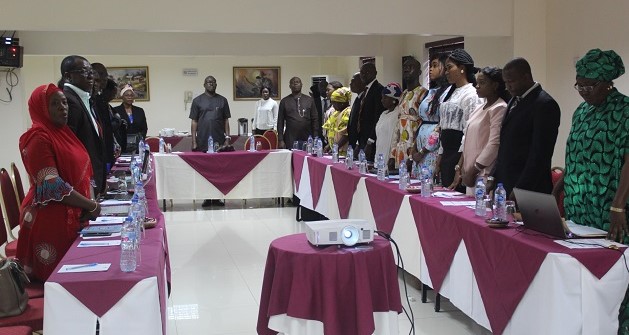The National Biosafety Management Agency (NBMA) has begun drafting of guidelines for the proper regulation of genome editing in Nigeria.

Director General/CEO, NMBA, Dr. Rufus Ebegba, while speaking at the guideline drafting workshop in Abuja, said there is the need to have proper guidelines for regulation of genome editing which is an emerging aspect of modern biotechnology.
He stated that the Federal Government under President Muhammadu Buhari saw the need to regulate this emerging sector that has demonstrated strong potential to transform the country’s economy.
“The amendment of the NBMA Act, 2015 includes Synthetic Biology, Gene Editing, Gene Drive and Biosecurity and this is aimed at expanding the scope of the Agency’s mandate to regulate emerging technologies,” he said.
Dr. Ebegba added: “The expansion of the scope of responsibility of the agency by the Federal Government is an indication of government’s firm resolve to ensure that any unintended effect that could result from the technology is nipped in the bud.”
He stated that the process of development of policies around emerging technologies is one that requires an understanding of the benefits, potential risks and socio-economic impacts of such technologies.
Principal Programme Officer for Environmental Biosafety and Coordinator of AUDA-NEPAD Office in Burkina Faso, Dr. Moussa Savadogo, lauded the Nigerian biosafety system as the best in Africa, noting that Nigeria is leading the continent in modern biotechnology regulation as the inclusion of gene drive and genome editing into the Biosafety Act was a good decision by the government.
He said: “Science, technology and innovation are at the forefront of development and Nigeria’s decision to include emerging technologies in her Biosafety Act speaks of the country’s commitment to improve her economy and remain the giant of Africa.
Senior Programme Officer with the NEPAD Agency African Biosafety Network of Expertise (ABNE), Mr. Sam Timpo, highlighted the need for the genome editing workshop, as agreed by all African Union member states.
Timpo said the regulation of modern biotechnology in Africa had great potential to help farmers overcome the many challenges being faced with their crops resulting from diseases and pests.
He noted that the workshop would help the participants to understand guidelines of genome editing in other countries.
Head, Planning, Research & Statistics, Mrs. Bello Scholastica, in her paper presentation titled “Nigeria’s contribution to global negotiations on biosafety regulations”, shed some liht on Nigeria’s contribution to the past COP-MOP and the emergence of the NBMA DG/CEO as the chairman of the African Union Biosafety Regulators’ Forum.
Legal Adviser of the NBMA, Mrs. Nkeiruka Onyilofor Aja, in her presentation titled “Key Provisions of the NBMA Act Including Recent Amendments to the Act 2015”, said the laws regulating Genetically Modified Organisms are strict and called for the need for individuals or institutions to seek permit before importing or exporting GMOs to avoid facing the wrath of the law.
The three-day workshop on the drafting of national guidelines for genome editing which began on the Tuesday, October 8, 2019 ended on Thursday, October 10. It involved training of staff of the agency to strengthen their capacity on genome editing regulation. At the end of the workshop the NBMA is expected to have a draft guideline on genome editing.
